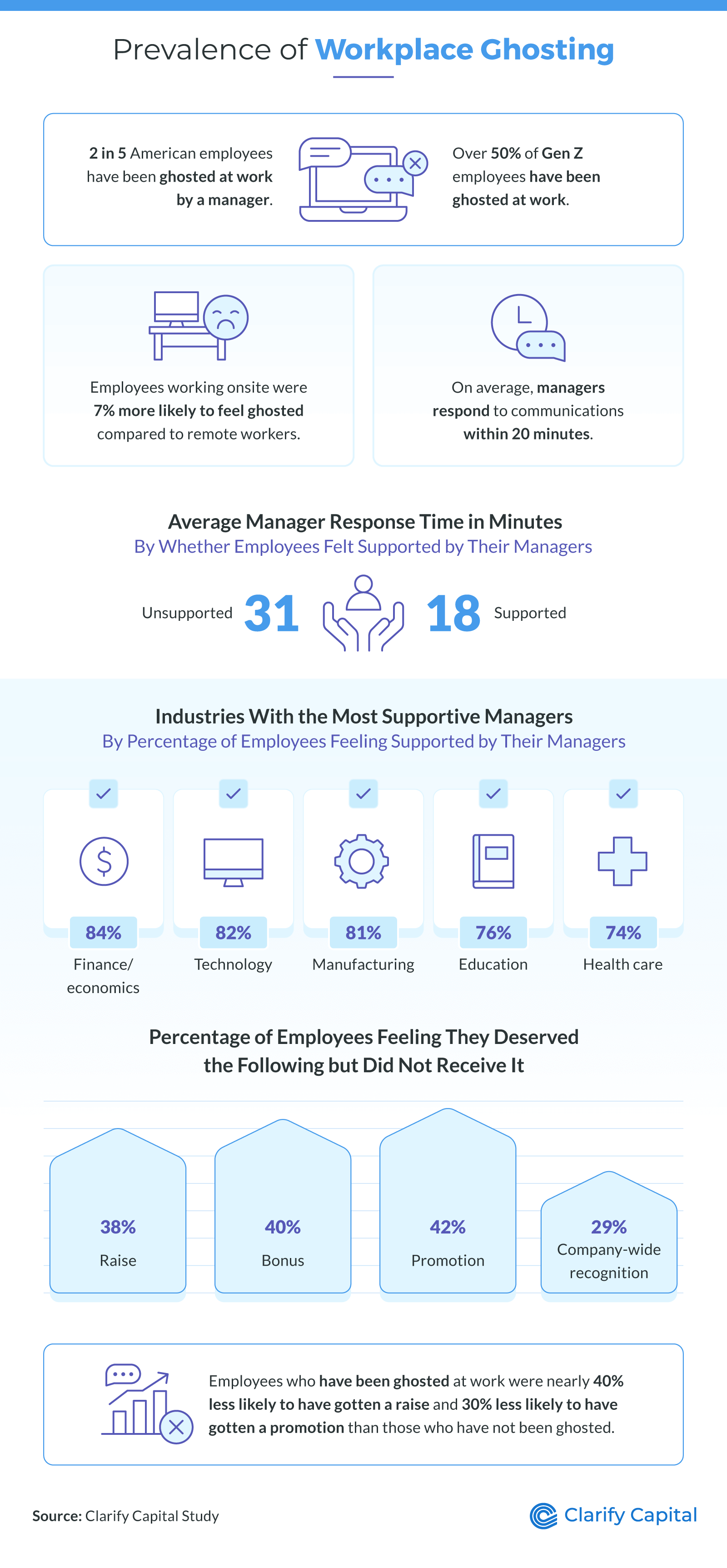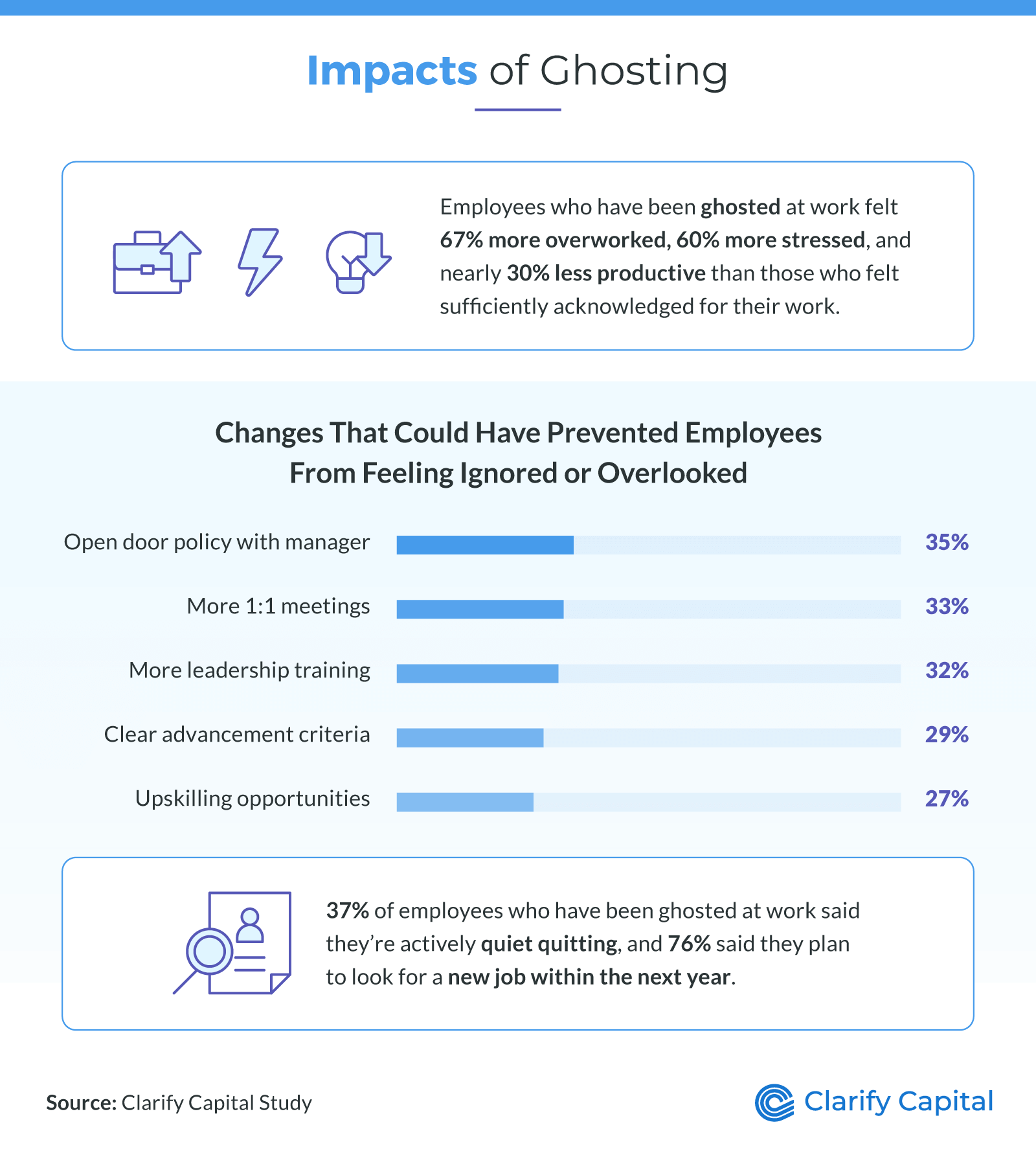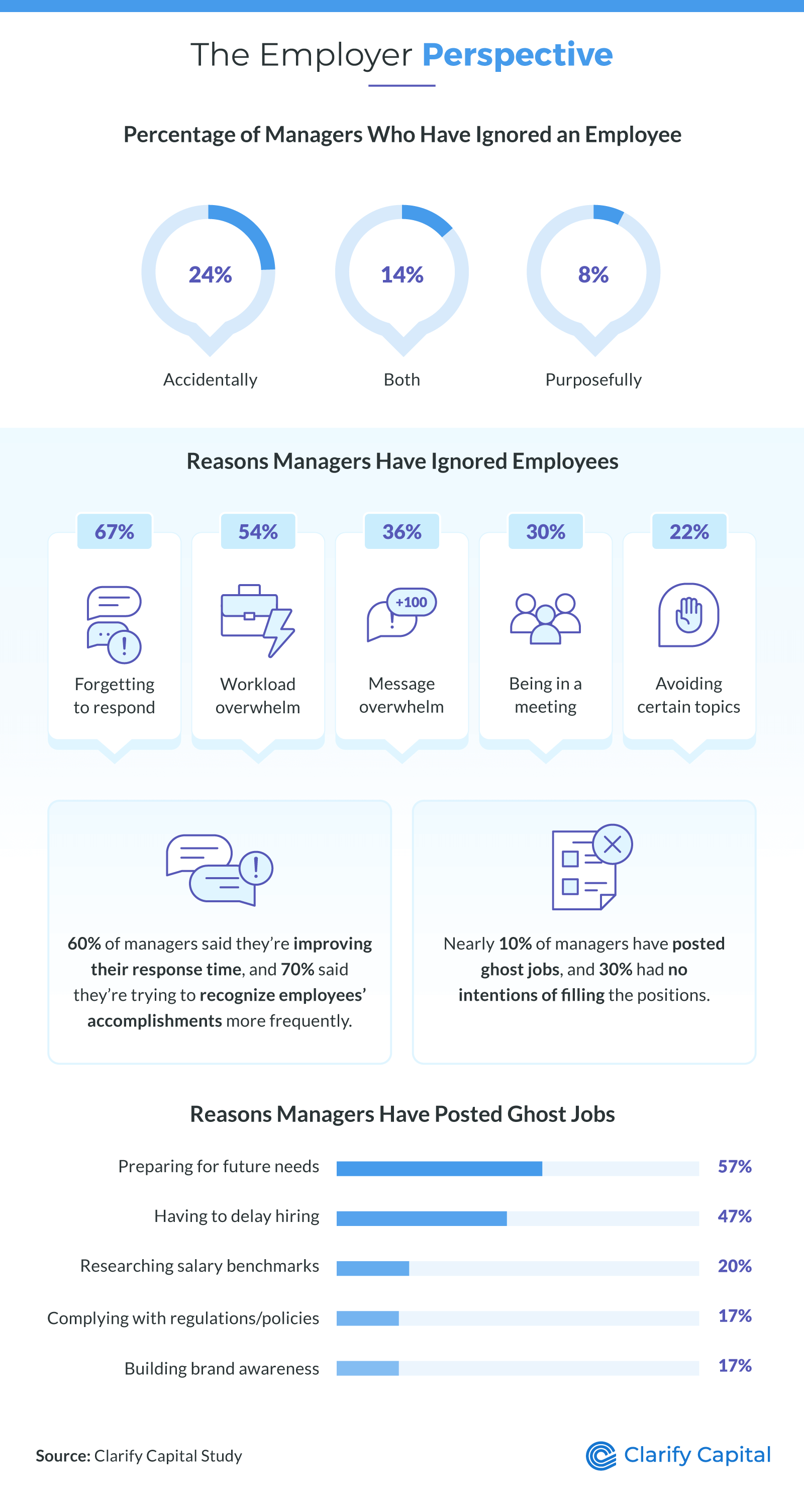We wanted to explore ghosting in the workplace: how common it is, its impact on employee morale, productivity, and retention, and how managers can foster a culture of recognition and support. Our findings offer insights about effective communication and acknowledgment in the workplace and why it’s important.
Key Takeaways:
2 in 5 American employees have been ghosted at work by a manager.
Employees who have been ghosted at work also felt 67% more overworked, 60% more stressed, and nearly 30% less productive than those who felt acknowledged at work.
37% of employees ghosted at work said they’re also actively “quiet quitting,” and 76% said they plan to look for a new job in the next year.
8% of managers have intentionally ignored employees, 24% did so by accident, and 14% did both.
Nearly 10% of managers admitted to posting ghost jobs, and 30% had no intentions of filling the positions.
Feeling Ignored at Work
Just how common is workplace ghosting? It turns out to be a widespread issue affecting employees across generations and work environments.

Many American employees (2 in 5) have felt ghosted at work, including over 50% of Gen Z. In-person workers were 7% more likely to feel ghosted than their remote counterparts.
Part of workplace ghosting has to do with how long it takes a manager to respond to their employees. We found that managers responded to communications within 20 minutes on average, but the response time varied depending on how supported employees felt. Those who didn’t feel supported by their managers waited an average of 30 minutes for a response, while those who felt supported waited only 18 minutes.
Some industries fared better than others when it came to managerial support. Health care (26%), education (24%), and manufacturing (19%) employees felt the most supported by their managers. This can have very real consequences. Employees who experienced workplace ghosting were nearly 40% less likely to receive a raise and 30% less likely to receive a promotion than those who were not ghosted.
Concerned your employees feel like they’ve been ghosted? They might if they feel similarly to the 38% of our respondents who felt they deserved a raise in the past year but didn’t receive one. There were also 42% who felt due for a promotion, 40% who thought they deserved a bonus, and 29% who felt they deserved company-wide recognition but never got it.
Consequences of Workplace Ghosting on Employees
Being ghosted at work can take a big toll on employees’ well-being and performance. These are the detrimental effects on employees who feel unacknowledged and unsupported in their workplaces.

Employees who had been ghosted at work felt 67% more overworked, 60% more stressed, and nearly 30% less productive than those who felt sufficiently acknowledged for their work. What can you do to make sure your employees don’t feel ignored? Try an open-door policy; 35% of the employees we surveyed said this change would keep them from feeling their manager is ignoring them. Other strategies they suggested were offering one-on-one meetings (33%) and more leadership training (32%).
When we asked how company culture played a role in employees’ feeling ghosted, 29% said they’ve felt ignored in a customer-focused culture that prioritized clients, 21% said the same of a hierarchical culture that encouraged avoiding mistakes and sticking to the rules, and 15% pointed to a purpose-driven culture that encouraged bonding over shared ideals or goals.
Leadership style was another factor that contributed to workplace ghosting. Almost a third (31%) felt ignored by pacesetting leaders who expected excellence and self-direction, 20% by authoritative leaders who mobilized people toward a vision, and 17% by coercive leaders who demanded immediate compliance.
If any of these sound like you, make sure your employees feel heard and understood to keep your company culture from turning “ghostly.” Otherwise, the consequences could be dire: 37% of employees who have been ghosted at work said they’re actively “quiet quitting,” and 76% said they plan to look for a new job within the next year.
How Managers Contribute to Workplace Ghosting
While employees bear the brunt of workplace ghosting, we also wanted to understand managers’ perspectives. Our study sheds light on the possible reasons behind this ghosting behavior and how managers address it.

Only 8% of managers said they purposefully ignore their employees, but 24% have ignored them accidentally. Another 14% have ignored them both intentionally and accidentally at different times. Their most common reasons were forgetting to respond (67%), being overwhelmed with their workload (54%), and being overwhelmed with the number of messages they receive (36%). On a positive note, 60% of managers said they’re improving their response time, and 70% said they’re trying to recognize employees’ accomplishments more frequently.
However, nearly 10% of managers have posted ghost jobs, which 30% said they had no intention of filling. Companies sometimes post these jobs without intending to fill them right away, often to test the market. But this can turn into another form of workplace ghosting when, for example, a recruiter stops communicating after making a job offer.
The reason 57% of the managers we surveyed posted ghost jobs was to prepare for future hiring needs, and 47% had started out intending to hire someone but had to delay the process. Another 20% said it was to gather data on salary expectations.
Building a Supportive Work Environment
Workplace ghosting can have bad consequences for employee morale, productivity, and retention, and the best way to prevent this is by creating a positive and supportive work environment. Prioritize effective communication, recognition, and transparency to make sure your employees feel valued, heard, and appreciated for their hard work and contributions.
Try implementing open-door policies, regular one-on-one meetings, and leadership training to mitigate the negative effects of workplace ghosting. Be mindful and intentional when posting job openings, and provide candidates with timely updates to build trust and maintain a strong employer brand.
Every employee — current and prospective — deserves to feel valued and acknowledged for their contributions. By fostering a culture of recognition and support, you can create a more engaged, productive, and loyal workforce.
Methodology
We surveyed 813 American employees and 342 managers to explore the phenomenon of “workplace ghosting,” where employees feel overlooked or ignored by their managers. The average age of employee respondents was 38 and comprised 48% males, 51% females, and 1% non-binary individuals. Their generational makeup included 4% baby boomers, 25% Gen X, 54% millennials, and 17% Gen Z. The average age of managers was 41 and comprised 63% males, 36% females, and 2% non-binary individuals. Their generational makeup included 7% baby boomers, 30% Gen X, 53% millennials, and 10% Gen Z.
About Clarify Capital
Clarify Capital delivers up to $5 million in fast, affordable funding for business owners. We pride ourselves on building lasting relationships with our clients and giving them the support they need to succeed in today’s competitive market.
Fair Use Statement
You may reuse these data in a noncommercial context as long as you acknowledge this page with a link.

Bryan Gerson
Co-founder, Clarify
Bryan has personally arranged over $900 million in funding for businesses across trucking, restaurants, retail, construction, and healthcare. Since graduating from the University of Arizona in 2011, Bryan has spent his entire career in alternative finance, helping business owners secure capital when traditional banks turn them away. He specializes in bad credit funding, no doc lending, invoice factoring, and working capital solutions. More about the Clarify team →
Related Posts





